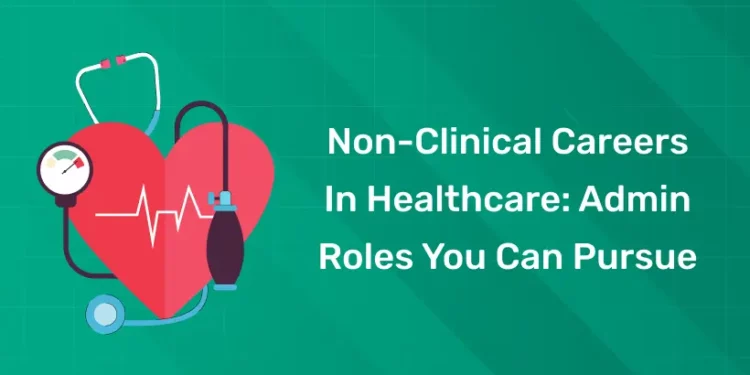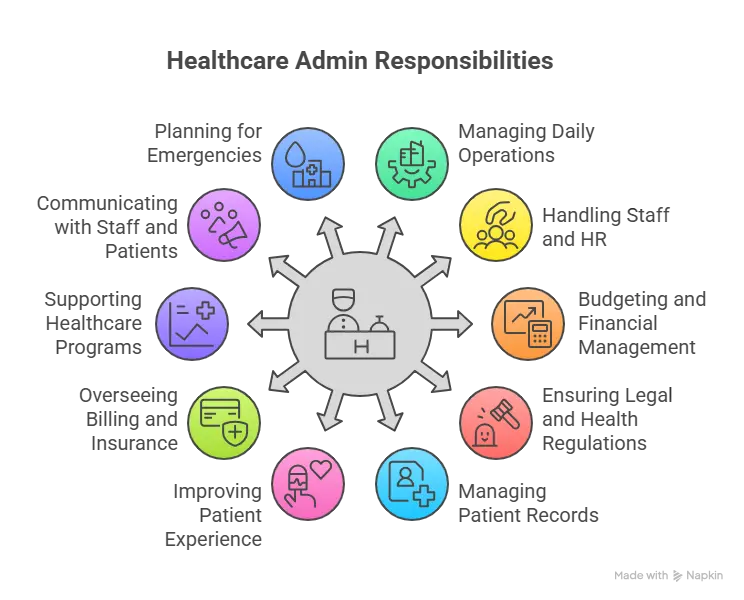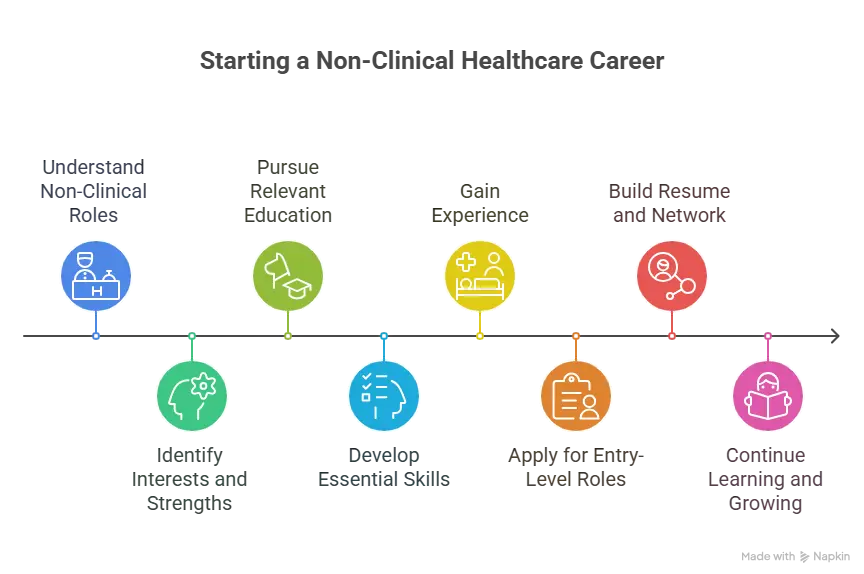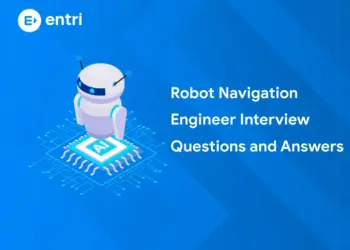Table of Contents
When we think about healthcare, we often imagine doctors and nurses. But there is another important side: non-clinical careers. These roles do not include direct patient care, but are necessary for the smooth operation of hospitals and clinics. From hospital administrators to medical billing professionals, non-clinical jobs provide good career opportunities for those who want to work in the healthcare system without medical degrees. In this blog, we will discover some top non-clinical healthcare roles that you can pursue, especially in administration, and how they contribute to better patient care.
Explore Your Future in Hospital Administration! Enroll now
Top Administrative Roles in Healthcare
The healthcare system is not just about doctors and nurses. Many important people work behind it to ensure that hospitals and clinics run smoothly. The health administrators help manage people, finances, medical records, and overall business. Let’s find out some top administrative roles in the health care system:
1. Hospital Administrator
Hospital administrators should ensure that all the patients get good care in a good, safe, and well-managed atmosphere.
-
They oversee the daily operations of the hospital.
-
They manage staff, departments, and budgets.
-
They make sure everything follows health rules and policies.
2. Clinical Coordinator
Clinical Coordinators ensure that medical services are delivered smoothly and on time.
-
They help plan and organize medical services.
-
They work with doctors, nurses, and patients to improve hospital care.
-
Also, handle patient records, schedules, and hospitals entire treatment plans.
3. Health Information Manager
The accurate medical records help doctors to treat patients better and ensure legal compliance.
-
Health Information manager manage patient data and medical records.
-
Ensure all the information is correct, secure, and confidential.
-
Use secured software to store and retrieve health records.
4. Medical Office Manager
Medical Office Manager should keep the medical office organized and provide support to both staff and patients.
-
They run the front office of a clinic or doctor’s cabin.
-
They supervise the receptionists, billing staff, and clerical workers etc,
-
Also schedule appointments and manage office supplies.
5. Medical Billing and Coding Specialist
The Medical billing and coding specialist ensure healthcare providers get paid on time and patients aren’t overcharged.
-
Convert healthcare services into medical codes.
-
Send bills to insurance companies.
-
Help patients understand their bills and insurance claims.
6. Human Resource (HR) Manager in Healthcare
HR manager in healthcare will build strong teams and create a safe working environment.
-
They hire doctors, nurses, and other staff.
-
They handle employee relations, salaries, and training.
-
Make sure all workers follow hospital rules.
7. Patient Care Manager
The Patient care manager make sure patients feel comfortable and get the care they need.
-
Focus on the quality of care patients receive.
-
Plan care strategies and supervise care staff.
-
Speak with patients and families about care options.
8. Medical Records Manager
Medical records managers duty is to protect sensitive health information and support legal and medical needs.
-
Oversee the storage and handling of medical records.
-
Train staff to use record-keeping systems.
-
Ensure data is safe, private, and accurate.
9. Public Relations Officer in a Hospital
The Public relations officer will build trust and a good reputation for the hospital in the community.
-
Communicate hospital news to the public.
-
Manage social media and hospital events.
-
Handle patient feedback and media queries.
10. Healthcare Financial Manager
Healthcare financial managers help hospitals stay financially stable while keeping all services affordable for patients.
-
Prepare budgets and manage expenses.
-
Monitor financial reports and billing practices.
-
They work with insurance and government agencies for payments.
Job Responsibilities of Healthcare Admin Professionals
1: What is the primary role of a hospital administrator?
The healthcare administration plays a major role in running the hospitals, clinics and health centres correspondingly. They do not treat the patients directly, but they ensure that everything works well with their treatment. Their job includes the health care system, organization and management.
1. Managing Daily Operations
Admin should make sure everything in the hospital or clinic is working properly every day.
Examples:
-
Opening and closing the facility on time.
-
Making sure all departments have what they need.
-
Solving problems that come up during the day.
2. Handling Staff and Human Resources
They manage healthcare workers like doctors, nurses, and clerks.
Examples:
-
Hiring and training new staff.
-
Creating work schedules.
-
Helping with employee issues and performance reviews.
3. Budgeting and Financial Management
They plan how to spend the hospital’s money and keep track of costs.
Examples:
-
Creating yearly budgets.
-
Managing salaries, bills, and purchases.
-
Making sure the hospital doesn’t spend too much.
4. Ensuring Legal and Health Regulations
They make sure the hospital follows all health laws and safety rules.
Examples:
-
Keeping patient information private (HIPAA rules).
-
Meeting fire, safety, and cleanliness standards.
-
Preparing for inspections and audits.
5. Managing Patient Records
They oversee how patient data and medical histories are stored and used.
Examples:
-
Using electronic health record (EHR) systems.
-
Keeping files safe, organized, and updated.
-
Making sure only approved staff access records.
6. Improving Patient Experience
They help make patients feel comfortable and well cared for.
Examples:
-
Reducing waiting times.
-
Responding to patient feedback and complaints.
-
Making the hospital a friendly and helpful place.
7. Overseeing Billing and Insurance
They handle how patients are billed and how insurance claims are processed.
Examples:
-
Making sure bills are correct.
-
Sending claims to insurance companies.
-
Helping patients understand their payments.
8. Supporting Healthcare Programs and Services
They help start or manage health programs like vaccination drives or wellness camps.
Examples:
-
Planning events or services for the community.
-
Advertising new healthcare services.
-
Collecting feedback to improve programs.
9. Communicating with Staff and Patients
They make sure information is shared clearly and on time.
Examples:
-
Sending updates about hospital policies.
-
Holding meetings with department heads.
-
Answering questions from patients and staff.
10. Planning for Emergencies
They get the hospital ready for emergencies like fires, disease outbreaks, or power cuts.
Examples:
-
Creating emergency response plans.
-
Training staff for emergencies.
-
Making sure backup systems are ready.
Explore Your Future in Hospital Administration! Enroll now
Hospital Administration Course with Assured Career Growth
Hospital Administration Course by Entri App: Master essential healthcare management skills, gain certification, and secure top roles in leading hospitals
Join Now!Skills Required for Non-Clinical Healthcare Careers
1. Communication Skills
Communication skill is one of the most important factors to be considered when working with an enterprise. Skilled professional should able to spoke and write clearly. Whether you are interact with patients, staffs or any insurance companies, your good communication helps to avoid any further confusions and can build their trust with the enterprise.
2. Organizational Skills
The non-clinical roles often include the handling of many different types of tasks and documents. In that case, you should be able to keep your time organized and managed well.
3. Teamwork and Collaboration
When entire team works together effortessly the hospital and clinics go smoothly. The non-clinical staff should work with doctors, nurses and other departments.
4. Problem-Solving Skills
You can face some challenges like sudden system errors, patient complaints or any other problems. The hospital admin should find a solution for those problems quickly and efficiently.
5. Technical and Computer Skills
Many non-clinical teams need to work with software such as Electronic Health Records (EHR), billing systems and spreadsheets. So that you should familiar with such softwares thouroughly.
6. Attention to Detail
The accuracy is important if you are in these roles. Because if any minor errors in patient data, invoicing codes or personnel records can cause major problems.
7. Leadership and Management Skills
If you are in a admin position, you must manage all staffs as a team lead, tasks and make decisions.
8. Customer Service Skills
Non-clinical roles often include direct interaction with each patients. Being kind, helpful to patients and professionals makes a great difference in their career.
9. Ethics and Confidentiality
You should keep patients’ information private by following the privacy policies and by proper rules for sharing medical details—like HIPAA guidelines in some countries.
10. Adaptability and Flexibility
The health care system always changes. You need to be open to learning new things and adjusting changes.
How to Get Started in a Non-Clinical Healthcare Career
If you want to work in the medical field, but not as a doctor or nurse, it can be a great alternative to start a non-clinical health career. These roles were focus on management, organization and support from health services.
1. Understand What Non-Clinical Healthcare Means
Non-clinical roles do not include treatment of patients. Instead, they include hospital administrators, medical billers, HR managers, reception employees working in hospitals.
Examples of Non-Clinical Jobs:
-
Hospital Administrator
-
Health Information Manager
-
Medical Billing & Coding Specialist
-
Human Resource Manager
-
Public Relations Officer
2. Know Your Interests and Strengths
You must think about what you’re good at and what you enjoy before get into the role.
-
Do you like working with numbers? → Try medical billing or finance.
-
Good with people? → HR or PR might be for you.
-
Organized and detail-oriented? → Health information management could be a fit.
3. Get the Right Education
Most non-clinical healthcare jobs should require a degree or certification in a preffered field. Here are some common courses you can take:
-
Hospital Administration
-
Healthcare Management
-
Medical Billing & Coding
-
Human Resources
-
Public Health
You can choose a diploma, degree, or any other certification programs based on your skills and need.
4. Develop Essential Skills
Skills are important factor no matter what non-clinical path you choose. And you can start working on skills such as:
-
Communication
-
Organization
-
Computer literacy
-
Problem-solving
-
Time management
5. Gain Experience (Even Small Counts!)
The experiences may look good on your portfolio and help to understand real healthcare atmosphere. Even if you don’t have enough experience, can pursue through:
-
Volunteer at hospitals or clinics
-
Take an internship or part-time job
-
Work in customer service or office roles to build skills
6. Apply for Entry-Level Roles
If you’ve a basic education and a few skills, it’s a great idea to start applying for entry-level roles. These positions help you learn and grow into greater responsibilities over time.
-
Front desk receptionist at a clinic
-
Medical records assistant
-
Billing clerk
-
Admin assistant in a hospital
7. Build Your Resume and Network
-
Keep your resume simple and updated with your education, skills, and any experience.
-
Join LinkedIn and follow healthcare professionals and organizations.
-
Attend job fairs, webinars, and events related to healthcare careers.
8. Keep Learning and Growing
Healthcare is always changing. Stay updated by:
-
Taking short online courses
-
Attending workshops
-
Earning advanced certifications
-
Reading healthcare news
This helps you get promotions and better jobs in the future.
Explore Your Future in Hospital Administration! Enroll now
Conclusion
Non-clinical careers in the healthcare system plays an important role in keeping hospitals and medical facilities running smoothly. These administrative roles may not include direct patient care, but they are equally important for supporting patients, doctors and general health care. From hospital administrators and human resource managers to billing experts and health information officers, there are several career paths based on your skills and interests.
Whether you are a recent graduate, a career change or only interested in working in the healthcare system without a medical degree, the non-clinical roles provide satisfaction with creating stability, development opportunities and meaningful effects. With the right education, skills and experience, you can create a successful and complete career in health administration.
Hospital Administration Course with Assured Career Growth
Hospital Administration Course by Entri App: Master essential healthcare management skills, gain certification, and secure top roles in leading hospitals
Join Now!Frequently Asked Questions
What are non-clinical careers in healthcare?
Non-clinical careers are roles that support healthcare operations without direct involvement in patient care. These include administrative, technical, and support roles such as hospital administrator, medical biller, and HR manager.
Do I need a medical degree to work in a non-clinical healthcare role?
No, most non-clinical roles do not require a medical degree. A diploma, bachelor’s degree, or certification in healthcare administration, billing, HR, or related fields is often enough.
What are the top administrative roles in healthcare?
Some of the top admin roles include Hospital Administrator, Medical Office Manager, Health Information Manager, HR Manager, and Billing & Coding Specialist.
Are non-clinical healthcare careers in demand?
Yes, non-clinical roles are in high demand as hospitals and healthcare facilities grow. These positions are essential for smooth operations and regulatory compliance.
What skills are required for non-clinical healthcare careers?
Key skills include communication, organization, problem-solving, attention to detail, computer literacy, and teamwork. Leadership and customer service skills are also valuable for advanced roles.













